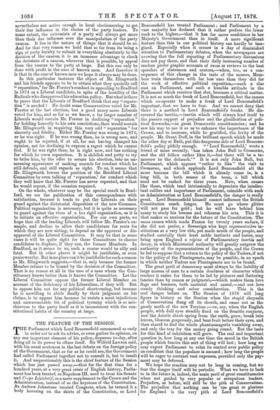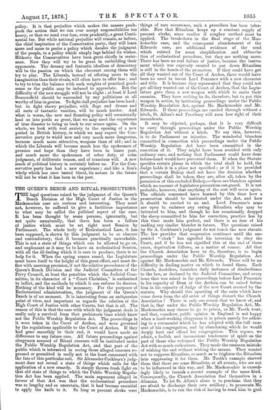THE FEATURE OF THE SESSION. T HE Parliament which Lord Beaconsfield
summoned so early in order not to ask its advice, or even gather its opinion, on any one important element of his policy, disperses to-day, after doing all in its power to efface itself. Sir Wilfrid Lawson said, with his usual acuteness in the last debate on the foreign policy of the Government, that as far as he could see, the Government had called Parliament together not to consult it, but to insult it. And unquestionably this is the chief feature of the Session which has just passed away,—that for the first time for a hundred years, at a very great crisis of English history, Parlia- ment has been treated, as Napoleon DI used to treat his Senate and Coips Le'gislatif, as a mere supplement to the Crown and the Administration, instead of as the keystone of the Constitution. As Andrew Johnstone treated Congress, when he termed it a body hovering on the skirts of the Constitution, so Lord Beaconsfield has treated Parliament ; and Parliament by a vast majority has declared that it rather prefers the lower rank to the higher,—that it has far more confidence in her Majesty's Government than in itself. A more significant feature than this in our political history can hardly be ima- gined. Especially when it occurs in a day of diminished attention to Parliamentary debates, when the newspapers are avowing that the full reporting of Parliamentary discussions does not pay them, and that their daily increasing number of readers prefer graphic accounts of races or reviews to the best speeches of statesmen and orators,—when, too, as a con- sequence of this change in the taste of the masses, Mem- bers train themselves with far less care than they did for the work of effective political exposition,—such a slur cast on Parliament, and such a humble attitude in the Parliament which receives that slur, becomes a critical matter. It is not so much the freak of Lord Beaconsfield, but the causes which co-operate to make a freak of Lord Beaconsfield's important, that we have to fear. And we cannot deny that there is a method in Lord Beaconsfield's freaks. He dis- covered the inertia,—inertia which will always lend itself to the passive support of prejudice and the glorification of poli- tical fireworks,—in great Democratic constituencies ; and he saw his way to use it so as to enhance the importance of the Crown, and to increase, while he gratified, the levity of the people. Mr. Grant Duff, in the brilliant speech which he made the other day at Bath, put this dangerous side of Lord Beacons- field's policy pithily enough. "'Lord Beaconsfield,' wrote a friend of mine recently, has taken John Bull to Cremorne, and the old fellow rather likes it,—but there will be a to- morrow to the debauch." It is not only John Bull, but Parliament, which appears "rather to like" the visit to Cremorne, and which applauds Lord Beaconsfield all the more because the bill which is already come in, is a long bill, in both senses of the term, a bill which need not be cashed for three years. Now, when caws like these, which tend intrinsically to depreciate the intellec- tual calibre and importance of Parliament, coincide with such an Administration as Lord Beaconsfield's, the danger is really great. Lord Beaconsfield himself cannot influence the British Constitution much longer. He must go where glitter will not pass for gold ; but he will leave behind him many to study his lessons and rehearse his arts. This it is that makes us anxious for the future of the Constitution. The same causes which made France for twenty years endure, if she did not prefer, a Sovereign who kept representative in- stitutions at a very low ebb, yet made much of the people, and studied carefully their least noble instincts and tastes, may bring upon England a regime of Parliamentary inertia and decay, in which Ministerial authority will greatly outgrow the authority of the representatives of the people, and the Crown be led to suppose that a return to the policy of the Tudors, if not to the policy of the Plantagenets, may be possible, in an epoch in which neither Tudors nor Plantagenets are to be found.
The great peril of democracy must always be the liability of large masses of men to a certain deadness of character which renders it easier for them to be led by pictures and flattering fancies than by reason or judgment,—which makes them love flags and banners, both material and moral,—and not love steady thinking and sober consideration. This is the real danger before us. The Session of 1878 will long figure in history as the Session when the stupid chrysalis of Conservatism flung off its sheath, and came out as the gaudy moth of the new Toryism ;—or, say, when the English people, with dull eyes steadily fixed on the Semitic conjuror, saw the Asiatic shrub spring from the earth, grow, break into leaves, blossom gorgeously, and bear fruit before their eyes, and then stared to find the whole phantasmagoria vanishing away, and only the tray for the money going round. But the taste for this kind of exhibition will grow. The real and important question is, how long at any one time the mood in the British people which fancies this sort of thing will last ; how long we may expect Parliament to relax its control over public policy on condition that the populace is amused ; how long the people will be eager to contract vast expensea, provided only the pay- ment may be deferred.
We hope the reaction may not be long in coming, but we fear the danger itself will be periodic. What we have to look to in the future is, indeed, the main peril of great constituencies when not guided by very popular or scrupulous leaders. Prejudice, as before, will still be the pith of Conservatism. The prejudice that nothing can be too great or glorious for England is the very pith of Lord Beaconsfield's policy. It is that prejudice which makes the masses pooh- pooh the notion that we can ever accept responsibilities too heavy, or that we need ever fear, even prudently, a great Conti- nental foe. But while national prejudice will remain, as before, the chief inspiratien of the Conservative party, they will learn more and more to prefer a policy which dazzles the judgment of the people, to a policy which simply lags behind its wishes. Hitherto the Conservatives have been great chiefly in resist- ance. Now they will try to be great in outbidding their opponents. The dreamy and fantastic idealism of democracy will be the passion on which the cleverest among them will try to play. The Liberals, instead of offering more to the imagination than their rivals, will often have to offer less ; and to try to trim the balance with such weights of practical good- sense as the public may be induced to appreciate. But the difficulty of the new struggle will not be slight ; at least if Lord Beaconsfield should be succeeded by any politicians at all worthy of him in genius. To fight dull prejudice has been hard ; but to fight showy prejudice, with flags and drums and all sorts of fantastic vanities, will be much harder. And what is worse, the new and flaunting policy will occasionally lead us into perils so great, that we may need the experience of true disaster to bring us back to our senses again. On the whole, we look with real anxiety to the opening of a new period in British history, in which we may expect the Con- servative party to wield new and very much more dangerous, because much more attractive, weapons than of old ; and in which the Liberals will become much less the spokesmen of promise and hope than they have been in times past, and much more the spokesmen of sober duty, of calm judgment, of deliberate reason, and of tenacious will. A new reach of political history is certainly before us. For the Con- servative party has had a new experience ; and like a lion's whelp which has once tasted blood, its nature in the future will not be what it has been in the past.































 Previous page
Previous page